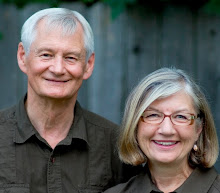With a couple jigsaw puzzle maps of Canada, groups of 4 students race to do them and they're very happy when all the pieces go together.
The first Sunday of the month is communion at the one Christian (Protestant) church in Qinzhou. The santuary is quite plain, but we are pleased that they have a new digital projector, so we could decipher enough Chinese to see that the pastor was preaching on Romans 7:23-25 "... but I see in my members another law at war with the law of my mind and making me captive to the law of sin which dwells in my members. Wretched man that I am! Who will deliver me from this body of death? Thanks be to God through Jesus Christ our Lord! So then, I of myself serve the law of God with my mind, but with my flesh I serve the law of sin." Without our bilingual Bible we'd be lost, since no one has spoken to us in English.
It was quite a contrast to visit the large Catholic church on Weizhou Island this past weekend. The island is a recent (in geologic time) volcano, and the church was built from local lava and coral by French entrepreneurs in the 19th century.
The interior is nicely restored, and we attended Sunday morning worship with a couple hundred Chinese.
The island has a lot of Christians, and the service began with antiphonal chanting, alternating between the men on the right side of the congregation and the women on the left. We recorded some video of what was our most uplifting church experience since we left Houston: http://persjohn.net/DSCN1021.AVI (The video link is temporary, we'll delete it after a few weeks to save file space.)This looked like a little impromptu rosary training after the worship service. The service was lead by two nuns, and with no communion we figured they didn't have a priest that morning.
Weizhou Island is only about 5 km across, and has nice beaches and great seafood.
We stayed over Saturday night at one of the many tourist hotels, and saw the sights on Sunday after church.
The volcanic soil is good for bananas, the main crop on the island, and also for flowers. But we had to make our way back to the ferry for the 40 km crossing to the mainland, and a couple hours on buses to get back home and be ready to teach on Monday morning.

















